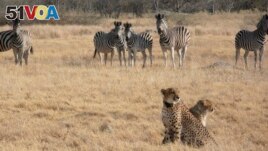14 November 2023
Cheetahs usually hunt during the day. But the fast cats change their activity to early morning and early evening hours during warmer weather, a recent study says.
The time change sets the creatures up for more possible conflicts with competing predators - such as lions and leopards - that often hunt at night, say the study writers. Their research was published recently in Proceedings of the Royal Society B.
Briana Abrahms of the University of Washington was a study co-writer. Abrahms said that changing temperatures can have an effect on "the behavior .... of large carnivore species and also the dynamics among species."

In this photo provided by Briana Abrahms, a female cheetah and her cub sit watchfully in front of a herd of zebra in northern Botswana on Aug. 23, 2011. (Briana Abrahms via AP)
While cheetahs only eat fresh meat, lions and leopards will sometimes take food from smaller predators.
"Lions and leopards normally kill prey themselves, but if they come across a cheetah's kill, they will try to take it," said Bettina Wachter of the Cheetah Research Project at the Leibniz Institute for Zoo and Wildlife Research.
"The cheetahs will not fight the larger cats, they will just leave," said Wachter, who was not involved in the study.
Hunting at different times of the day is one way to reduce meetings between the different predator species that share northern Botswana's mixed grass and forest lands.
But the new study found that on the hottest days, when daily temperatures got to nearly 45 degrees Celsius, cheetahs became more active at night. This means cheetahs spent 16 percent more time hunting when other big cats hunt.
Kasim Rafiq of the University of Washington and the nonprofit Botswana Predator Conservation Trust was another co-writer of the study. Rafiq said about the shared hunting hours: "There's a greater chance for more unfriendly encounters and less food for the cheetahs."
For the current study, researchers placed GPS devices on 53 large carnivores — including cheetahs, lions, leopards and African wild dogs. Researchers then recorded their positions and hours of activity over eight years. They compared this data with the highest daily temperature records.
While seasonal differences explain most temperature changes in the time between 2011 to 2018, the scientists say the observed behavior changes offer information about the future of a warming world.
In future research, the scientists plan to use audio-recording devices and accelerometers — "like a Fitbit for big cats," said Rafiq. The goal is to document the number of meetings between large meat-eating animals.
In addition to competition with lions and leopards, cheetahs already face strong pressure from the loss of living space and conflict with humans.
The fastest land animal, cheetahs are the rarest big cat in Africa, with fewer than 7,000 left in the wild.
"These climate changes could become really critical if we look into the future — it's predicted to become much warmer in this part of Africa where cheetahs live, in Botswana, Namibia and Zambia," said Wachter of the Cheetah Research Project.
I'm John Russell.
Christina Larson reported on this story for the Associated Press. John Russell adapted it for VOA Learning English.
______
Words in This Story
cheetah – n. a large wild cat that lives in Africa and Asia
predator -- n. an animal that lives by killing and eating other animals
carnivore -- n. an animal that eats meat
species -- n. a group of related animals or plants
dynamics -- n. the way that two or more things behave with each other
prey -- n. an animal that is hunted or killed by another animal for food
encounter - n. to meet someone or something without expecting to











